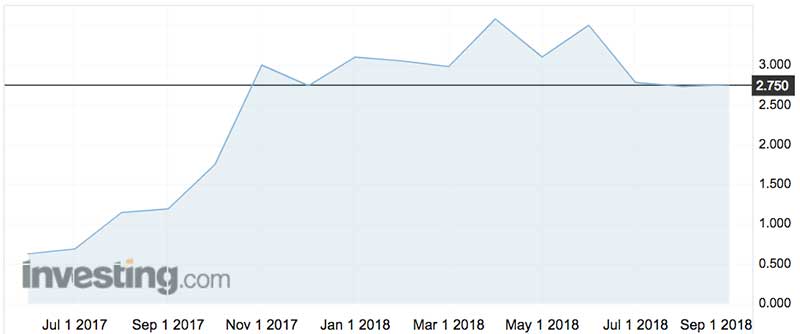What’s next for Australia’s biggest cannabis stock

Pic: Luis Alvarez / DigitalVision via Getty Images
In the first of a three-part Tim Boreham series on the Cannabis Corner stocks, it makes sense to kick off with Cann Group — the biggest pot play on the ASX as measured by market cap.
In essence, Cann Group is taking a “grow it and they will come” approach to local and global medical cannabis markets.
Not that we’re saying Cann (ASX:CAN) lacks substance, so to speak.
Unlike most of its peers, Cann is emphasising supply, refinement and distribution of the product, rather than focusing on specific clinical applications or over-the-counter skincare products.
In its own words, Cann aspires to a fully integrated business model covering cultivation, research and development, manufacturing, packaging, exports and clinical evaluation.
The first cannabis stock to obtain a research and cultivation licence, Cann is already growing in earnest at a facility in southern Melbourne. (The so-called Southern Facility is not identified for obvious reasons.)
The company produced its first crop in August last year and since then has harvested several more crops.

Cann has a bigger facility in northern Melbourne (yep, the Northern Facility) focused on genetics and tissue culture work.
In July next year, Cann will turn the first sod on a state-of-the-art, 37,000 square metre growing and research facility at Tullamarine (Melbourne’s primary international airport), which puts a new definition on the term ‘up, up and away’.
Cann’s landlord, Australia Pacific Airports Melbourne, is contributing to the $100 million project with an unquantified lease incentive.
A ‘potted’ history
Cann Group came about after a music industry entrepreneur called Michael Murchison approached now Cann chairman Allan McCallum about a US cannabis export opportunity.
Perversely, Canberra’s legalisation of medical cannabis meant that opportunity would no longer fly because of tight regulatory requirements. So the newly born Cann Group re-focused on domestic opportunities (Mr Murchison is no longer involved with the company).
There are strong links between Cann Group and Nufarm, which is apt because the crop protection group knows all about “weed”.
Doug Rathbone, who ran Nufarm for 40 years, sits on the Cann Board. Cann chief executive officer Peter Crock had a 28-year career at Nufarm in senior roles including marketing and business development.
Cann Group listed on May 3, 2017, having raised $13.5 million at 30c apiece, with Canada’s Aurora Cannabis a cornerstone investor with a then 19.9 percent stake.
The impetus for the initial public offer was the passing of the Narcotic Drugs Amendment Act, which in effect decriminalised the medical cannabis sector.
Slicing the red tape
If the medical cannabis market were some kind of free-for-all, we dare say Cann’s value would be negligible as every Tom, Dick and Pothead would be growing the stuff.
But, of course, that’s far from the case, with the sector overlaid by daunting regulatory requirements.
So far, Cann has navigated the legislative shoals deftly, winning a coveted research and cultivation licence from the Office of Drug Control in February and March 2017.
But as Mr Crock notes, a permit to grow at a specific approved location is just as important as a licence.
The company won this paperwork in May 2017, pertaining to the Southern facility. “We had a working model and a physical facility in place that (the authorities) could audit,” Mr Crock said.
The company wasted no time planting its first crop and harvested the plants in August last year.
Mr Crock believes Cann remains one of only three permit holders, one being the private Western Australia-based Little Green Pharma and the other an unknown party.
>> Here is Stockhead’s list of which ASX pot stocks have which licences.
Cann obtained a licence to import and export raw cannabis for analytical testing purposes in October 2017.
In January 2018, the Federal Government allowed local producers to export medical cannabis.
In March this year, Cann obtained a permit from Canada to import genetics and oil products from its Canadian partner and biggest shareholder Aurora Cannabis.
Cann is now working with Aurora Cannabis and cannabis genetics specialist Anadia Labs to identify the most suitable material for import.
- Subscribe to our daily newsletter
- Bookmark this link for small cap news
- Join our small cap Facebook group
- Follow us on Facebook or Twitter
“Our focus is on Australian patients first and foremost, but to be competitive we need to export in the short term,” he said.
“The export opportunity is around a Therapeutic Goods Administration [TGA] approved level of product to set it apart from other material.”
Take your partners
Cann is also more partnered-up than Elizabeth Taylor, both here and abroad.
In the June quarter, Cann signed a memorandum of understanding with La Trobe University to expand its research and development links, with a view to a full strategic relationship agreement.
Helpfully, Cann is headquartered at the Walter and Eliza Hall Institute of Medical Research, at La Trobe University’s campus at Bundoora, in northern Melbourne.
Mr Crock sees an emerging shortage of skills in the medical cannabis sector and sees the uni as a fertile recruiting ground.
Students with experience in cannabis? We can see where he’s coming from …
In August last year, Cann signed-up with the Massachusetts based Cannakorp Inc for the rights to import a wisp vaporising delivery system.
Cann also has a tie up with Agriculture Victoria, research links with the CSIRO and a recently-announced manufacturing deal with contract drug manufacturer IDT Australia.
Cann Group recently supplied its first patient under the TGA’s special access scheme, but with material supplied by Aurora.
The company is yet to dose patients with its home-grown stash, but is working on dose formulations.
Financials and performance
Cann is essentially pre-revenue but generated $560,000 revenue in 2017-18.
This resulted from supplying the Victorian government with material via Agriculture Victoria, to fuel paediatric epilepsy trials.
Cann also chalked up $943,000 of other income, mainly from interest.
The company lost $4.7 million.
Cann has just under $50 million in the bank, having raised $78 million in an oversubscribed placement and share purchase plan last September (at $2.50 a share).
The proceeds will be used for the stage three (Tullamarine) development and to support clinical trial activity.
After their robust listing, Cann shares have traded at a low of 48c in mid-June 2017 and peaked at $3.90 in early January this year, on unfounded rumours that Aurora was mulling a takeover.
Dr Boreham’s diagnosis
While we all know that medical marijuana is coming in a big way, it’s impossible to glean accurately the likely size of the domestic market.
Currently, about 1,200 patients have access to cannabis treatments via the Therapeutic Goods Administration’s special access scheme, mainly for the alleviation of chemotherapy-induced nausea, cancer pain and epilepsy.
What’s clear is that the local regulations will preclude the ‘wink wink nudge nudge’ culture seen in the US, which sees docs willing to prescribe cannabis for spurious maladies.
Here, would-be patients must demonstrate they have tried other treatments unsuccessfully.
The best guide is Canada, which has legalised medical pot since 2011.
Health Canada puts the current size of the market at $C380 million ($A395 million) across 300,000 patients, growing to $C1.3 billion within a decade.
The US market is fragmented (dis-jointed?) in an industry and regulatory sense, but legal marijuana sales (recreational and medical) are estimated at around $US6 billion.
Pain Australia estimates one in five of us live with chronic pain, which implies wide misuse of prescription opiates or alcohol.
Apart from the Nufarm links, Cann ‘s board boasts other ‘real life’ business experience: Chairman Allan McCallum is also chairman of the listed salmon producer Tassal and a director of the ‘green whistle’ Penthrox analgesic producer Medical Developments
Impresario Phil Jacobsen adds some showbiz spark to the board, while Geoff Pearce owns a private pharmaceutical packaging company and is a director of the listed contract drug maker Probiotec and household products supplier McPhersons.
For investors it’s a moot point whether Cann’s market cap accounts for the upside and when it comes to aspects such as doctors’ acceptance of cannabis treatments much more work is required.
But there’s no doubting the company’s commercial expertise and Cann-do attitude.
Disclosure: Dr Boreham is not a qualified medical practitioner and does not possess a doctorate of any sort. He has never inhaled but has been called a dope many times.
The content of this article was not selected, modified or otherwise controlled by Stockhead. Stockhead has not provided, endorsed or otherwise assumed responsibility for any financial product advice contained in this article.
This column first appeared in Biotech Daily
UNLOCK INSIGHTS
Discover the untold stories of emerging ASX stocks.
Daily news and expert analysis, it's free to subscribe.
By proceeding, you confirm you understand that we handle personal information in accordance with our Privacy Policy.








